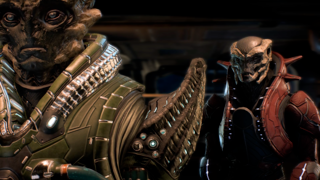
Mass Effect: Andromeda is a marked improvement over its predecessors in two areas: graphics and gunplay. The Frostbite engine proves itself quite capable of rendering the best-looking alien locales in Mass Effect history, and the shooting is more nimble and varied than it's ever been. In every other way--assembling a crew of engaging characters, meeting exotic aliens with intriguing stories to tell, flying around in your own starship solving problems big and small in a galaxy colored in shades of gray; in other words all the things that make Mass Effect unique and memorable--Andromeda takes one, two, or three steps back. It's also an utter mess in a technical sense. There are a few enjoyable moments here and there, and over time you can see the skeletal framework of a better game start to emerge, but given the heights Mass Effect has reached in the past, it's hard to believe this is what we've been waiting five years for.
BioWare gave itself an easy out with this game's story, after Mass Effect 3's controversial conclusion to the Reaper threat pretty much rewrote the rules of the series' familiar setting. That in itself is a missed opportunity; in a setting already rife with interspecies sociopolitical strife, exploring how the balance of power shifted in the Milky Way after the Reapers were out of the picture could have been fertile narrative ground. Instead, we've sailed a bunch of colony ships 600 years into the future and to the Andromeda galaxy, wiping the slate clean for the writers to lay down a whole new set of rules. But the game does very little of interest with this new freedom. In leaving behind a game world that revolves around ancient alien technology to reach this new environment of limitless possibilities we get... another galaxy that revolves around a different set of ancient alien technology, and for the most part that tech merely serves as a convenient space-magic plot driver rather than a narrative direction to be explored in its own right. You just happen to be the only character in all of Andromeda who can interface with this technology; be prepared to activate weird alien terminals to make plot things happen without any explanation, time and again.
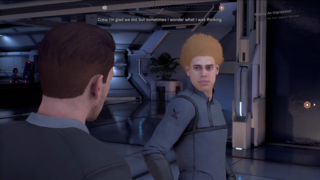
In addition to humans, Mass Effect standbys like turians, salarians, and krogans have made the trip to Andromeda, but with a few exceptions like a colony of angry krogan exiles, these species' unique characteristics are mostly deemphasized so the story can use them interchangeably in the colonization efforts. Story-wise, there's some early promise in the way things have gone wrong with the Andromeda Initiative; when you show up, there's been death and revolt on the Nexus (a slightly contrived Citadel stand-in space station), resulting in a minor crisis of Initiative leadership and an array of exiled Milky Way scoundrels scattered around the Heleus cluster, the small area of Andromeda where the game takes place. It also happens that none of the other colony ships have shown up on time, which creates a tantalizing mystery to solve. The story gets just a bit of interesting mileage out of the bureaucratic squabbles inherent in running a space colonization effort--who gets thawed out when is a major point of contention--and the ethical considerations of settling on already inhabited planets, but the game doesn't explore these areas as thoroughly as you'd want and expect out of Mass Effect, and the puzzle of those other missing ships, dangled in front of you for most of the game, isn't resolved in a particularly surprising way either.
The series' more esoteric factions like the quarians, volus, geth, elcor, and hanar are written out of the game entirely, and in their place there are exactly two new alien races, both of which largely manifest as humanoid soldiers with assault rifles for you to shoot at. Outside combat, the indigenous angarans serve as a scattered, oppressed native species trying to recover its history after centuries of turmoil brought on by the Scourge, a violent dark-energy phenomenon that never gets satisfyingly explained. The angarans have in more recent decades been subjugated by the kett, the monolithic, religious-cult antagonist force made up of silly-looking aliens covered in bony plates. Andromeda pays some lip service early on to the delicate nature of first contact with these new races, but in practice it rushes you through these encounters, and foregoes any narrative weight they might have had, so you can start accepting quests from or shooting at these new aliens, or both. Later there are a few brief attempts to flesh out the nature of the angaran and kett societies, but the game doesn't go far enough in that direction to give you much to chew on. Andromeda also references aspects of the previous three games on a regular basis, but almost all of these references feel shoehorned in, in a way intended to make you go "hey, I remember that!" rather than believably enhancing the story or contextualizing the new characters. There's a particular late-game reveal in this vein that was so predictable I almost felt insulted by it.
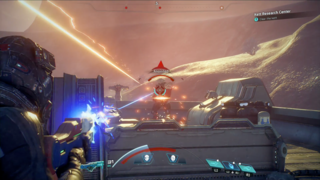
I could happily look past a trite and overly video-gamey core scenario if Andromeda's assembled cast of crew mates and peripheral figures were as engaging as in previous games; Mass Effect has frequently done its best storytelling around the edges of the main plot, after all. But despite a couple of interesting origin stories--Cora, the human biotic so freakishly powerful she ended up running with an asari commando unit, and Jaal, the contemplative angaran warrior-monk type who's probably the standout party member--I never got close to feeling the same attachment for Andromeda's squadmates that I did for the various crews of the Normandy, nor did any of the dozens of incidental characters or side quest storylines connect with me in an especially memorable way.
There's been plenty of uproar about the game's lousy facial animations, and those are certainly a problem. Seriously, it rarely feels like these characters make eye contact with each other while they're talking, instead staring glassily into the distance or tilting their eyes wildly around the room. But worse, an awful lot of the dialogue in Andromeda is just awkwardly written and presented. There are some really peculiar turns of phrase and a ton of sloppy, poorly paced editing in cutscenes that makes it hard to connect with and sometimes even understand what people are talking about or what just happened. A few of the cutscenes, especially in side quests and even a couple of your party members' loyalty missions, are so disjointedly assembled that they almost feel like they were never all the way finished. You do get a few fun or touching character moments here and there, but those moments are exceptions to the rule. There's an obvious shift in the tone and quality of the writing from that of previous Mass Effect games, and most of it doesn't land well. In a series I've always thought of primarily as a conversation simulator with some shooting thrown in as a bonus, that's a serious problem.
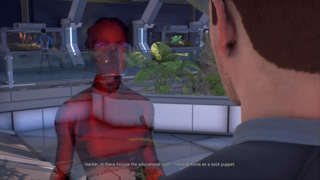
BioWare has taken Mass Effect in an open-world direction with Andromeda, giving you four major planets to explore in your six-wheel-drive vehicle (along with a handful of other smaller planetary areas to explore on foot). The idea of tearing around wild alien worlds, finding lots of cool little space stories to explore is exciting at first, until you realize that the vast bulk of the quest design in Andromeda is incredibly bland. Outside of the main storyline missions, which are at least focused and move at a brisk enough pace, you'll have the chance to solve dozens of aggressively uninteresting space errands that mainly involve you going to one or more places the quest giver tells you, scanning/using/picking up/killing something, then returning for a couple of lines of inconsequential dialogue and some experience points. The game also crowds your log with an absolutely overwhelming number of quests split into four different tiers and across multiple locations, to the point that it can become nearly impossible to keep track of everything you have on your plate at once. I eventually gave up on trying to keep all the quests straight in my log and just looked at all the objective markers on the map anytime I returned to an old location, and it's telling that quite often when I got around to finishing a given side quest, I'd forgotten who gave it to me or why I was doing it in the first place. The in-game map is unwieldy and not very detailed, and the on-screen compass is pretty bad at pointing you toward nearby objectives too. For a game built around dozens of quests, the tools for organizing and tracking those quests aren't very helpful at all.
Worse, many of the longer quest chains require you to bounce back and forth between multiple planets for contrived reasons, and since the transit animations between systems and from planet to planet are all interminably long and unskippable, a side quest that could have been completed in a couple of minutes in a single location becomes agonizingly tedious as it stretches over 20 minutes or more. At one point late in the game I spoke to a character at a crashed shuttle who... instructed me to go meet him in a cave on a completely different planet, where, after five minutes of travel, we had a 30-second conversation that ended the quest. There's a remarkable amount of back-and-forth and busywork involved in most of the side quests, and the little shreds of world-building payoffs you get from finishing them rarely feel worth it. Even the best (or, if you like, the most Mass Effect-y) side quest lines that come to mind don't feel up to the series' standards. One, which involves you duping a group of anti-AI terrorists into thinking they've hacked the computer in your head, thoughtfully explores the deep mistrust for artificial intelligence that exists in the Mass Effect universe via a few datapads strewn around, but even that quest ends in an underwhelming way. And those datapads were among the very few that really felt worth stopping to look at. Actually, that might be the most damning thing I can say about Andromeda: I quickly stopped caring about reading anything I didn't have to. Previous games made you voraciously want to read everything.
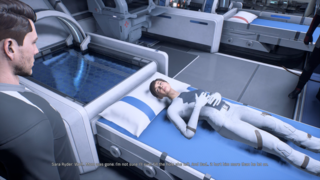
One of the more satisfying things about the way Andromeda plays out comes as you travel from planet to planet, solving a bunch of local problems that eventually makes way for you to establish an outpost, at which point a bunch of pre-fab settlement buildings drop out of the sky and you've got a nice little base where before there was only alien wilderness. This feeds into a perk system--nominally, you're generating extra resources that let you thaw out more specialists on the Nexus, though in practice you're just unlocking passive upgrades--and the first time you build a base, you're even asked whether you want a scientific facility or a military outpost. Unfortunately that choice doesn't manifest in very meaningful ways, and you're never even given the choice again, but it did make me briefly hope some kind of management-sim layer would manifest and let me tweak a bunch of particulars about the way the different colonies were being run. But like most of the good ideas in Andromeda, this one isn't explored very much. It's satisfying to plunk all those colonies down and watch them populate, with shuttles coming and going. It's just a shame they only function as side quest dispensers when the colonial effort could have become a core pillar of the gameplay.
The combat in Mass Effect: Andromeda is probably the best in the series and certainly the most successful thing in this package, which in itself is kind of a wild thing to say about a Mass Effect game. Even though you lose the ability to pause time and issue specific orders to your squadmates, you gain a set of jump jets that let you boost into the air and dash around the battlefield in a really fast-paced, satisfying way. The game also removes any notion of class restrictions; you can now put skill points into any ability from the combat, tech, and biotic categories, allowing you to put together whatever mishmash of powers you want. Moreover, the game unlocks hybrid "profiles" based on your skill allocation that gives you further buffs to the categories you've invested heavily in, and you earn enough skill points in a typical playthrough to experiment quite a bit and find play styles you like.
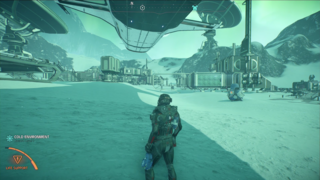
There's a decent set of crafting tools available that let you customize a wide array of weapons and armor to fit your play style which is relatively satisfying to dig into, although just like the quest interface, the gear and crafting are complicated by layer upon layer of unwieldy menus. And ultimately, after nearly 80 hours even the combat had thoroughly worn out its welcome with me due to a relative lack of variety in encounter design. Even the very last fight in the game is just a 20-minute slog against the exact same types of enemies you've been facing down for the entire game. If you really like the combat--and it is a lot of fun--the wave-based multiplayer from Mass Effect 3 returns here and offers a small variety of specific objectives--hack terminals, hold territory, take out VIP enemies--in addition to the standard kill-everything waves. There's a ton of unlockable character classes, weapons, and gear to collect and level up if you want to spend a lot of time grinding in multiplayer, and some missions even funnel materials back into your single-player campaign, but even with some variations in the types of enemies you fight each time out, I'd gotten my fill of the handful of maps available after a few hours.
If the game worked as advertised it would be merely decent to middling, but the technical state of Andromeda at the time of this writing is astonishingly poor, at least on the PlayStation 4. I just can't overstate how buggy this game is, nor can I remember ever playing a full-priced, marquee video game from a major publisher with such an embarrassingly wide array of glaring issues. I could fill the entire space of this review with nothing but the bugs I ran into, which tended to affect practically every aspect of the game, from conversations to NPC animations to quest logic, sound effects and dialogue triggers, combat encounters, character collision, crashes and infinite loading screens, and more. Some quests refused to complete when I satisfied their conditions; on the other hand, one particular early-game quest I'd already completed kept reasserting itself as my active quest hours later. One relatively major quest line disappeared from my log entirely, never to be seen again. The game occasionally thought I was in combat on my ship, where combat isn't even possible, and popped up the combat UI and visibly recharged my character's shields.
NPCs get stuck in the wrong animation, teleport around during conversation scenes, clip through scenery, or snap into T-poses so often during cutscenes that you just learn to start ignoring it, provided you can stop laughing. Characters talked over themselves with a second line of dialogue triggering on top of the first one. Dialogue about your exploits will occasionally contradict your quest progress and at one point a character referred to a quest as both complete and in progress in the same conversation. One of the rooms of my ship frequently failed to load as I walked by it, making the doorway look like a gaping hole into deep space. Enemies frequently get stuck in the world, preventing you from advancing quest progress. Quest-critical talk prompts would occasionally just refuse to work until I quit and restarted the game. A couple of times, quest scripting and cutscenes broke in such spectacular fashion that words don't do justice to the chaos (though you can see one of them embedded above). I could go on and on (and on), and any one or two of these issues in an otherwise functional game would be forgivable, but there are times when it feels like you're hitting several of these problems every hour, and over the course of dozens of hours it just undermines your ability to take the game seriously at all. BioWare has an alarmingly thin list of known issues on its forums, but has also pledged to address the state of the game in the near future. For the sake of their customers their plan had better start with some intensive bug-fixing before any DLC rolls out, because as it stands right now this thing is a real mess. Andromeda shouldn't have shipped like this.
For me, Mass Effect has at times been the best thing going in video games, so to see the franchise in such a sorry state is actually a little painful. Following up on Mass Effect 3 was never going to be easy, not just because that game's ending left so many people cold but also simply because the story had been told, the book on Commander Shepard closed. For the start of a new chapter to be so bad at the things Mass Effect has traditionally been so good at raises serious questions about where the series, and perhaps even BioWare, go from here.